Entrepreneurship and Small Business Management Report - Assessment 1
VerifiedAdded on 2021/01/03
|18
|5648
|59
Report
AI Summary
This report provides a detailed analysis of entrepreneurship and small business management, covering various aspects of entrepreneurial ventures, their typologies, and the similarities and differences between them. It investigates the impact of micro and small businesses on the economy using relevant data and statistics, emphasizing their importance for social and economic growth. The report also examines the traits, skills, and motivational drivers of successful entrepreneurs, differentiating them from business managers. Furthermore, it explores how background and experience can influence entrepreneurial endeavors, both positively and negatively, providing a comprehensive overview of the subject matter. The report is structured around two assessments, each addressing specific learning outcomes related to the course. The report includes an introduction, assessment sections, conclusion, and references. It covers topics such as different types of entrepreneurial ventures, the similarities and differences between them, the impact of small businesses on the economy, and the characteristics of successful entrepreneurs.

Entrepreneurship and Small
Business Management
Business Management
Paraphrase This Document
Need a fresh take? Get an instant paraphrase of this document with our AI Paraphraser
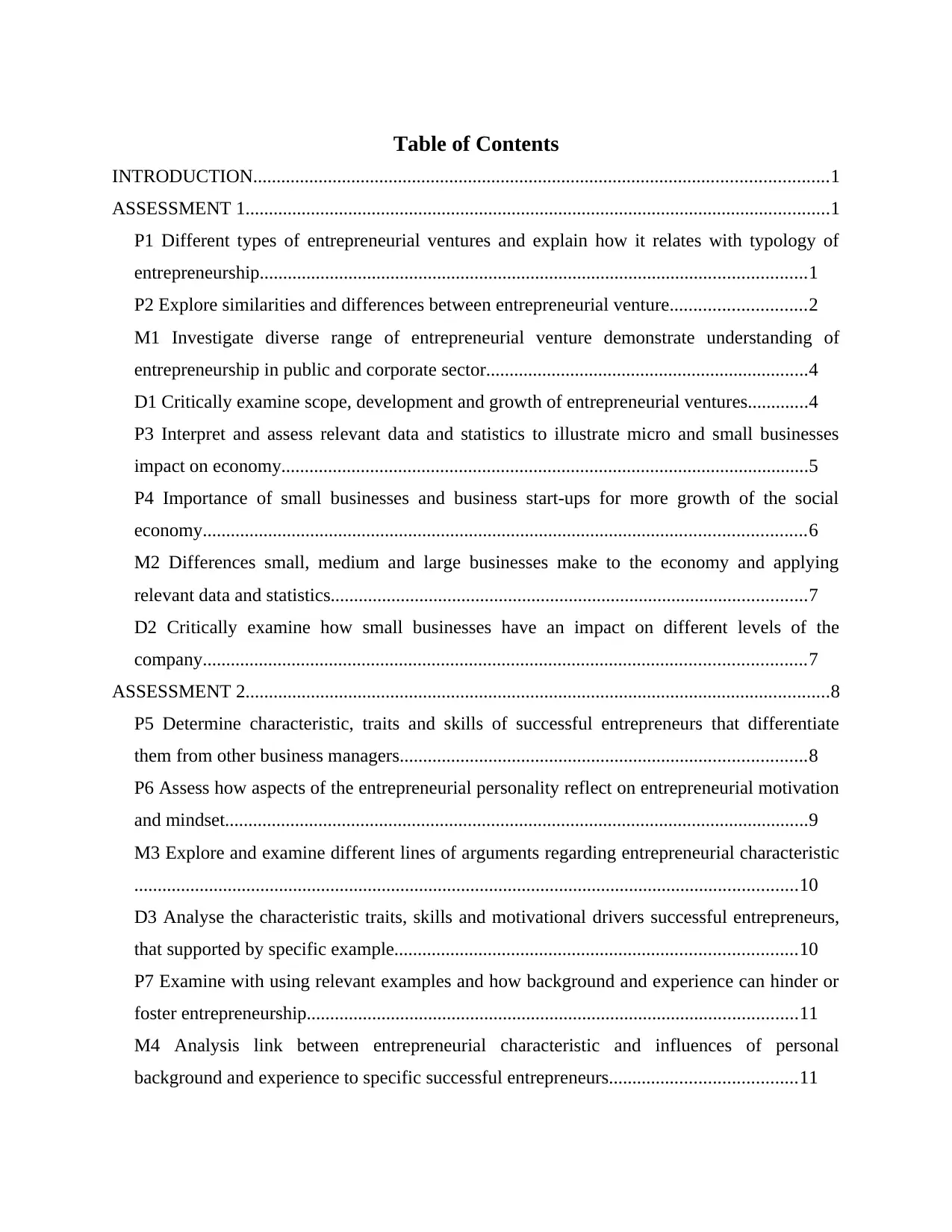
Table of Contents
INTRODUCTION...........................................................................................................................1
ASSESSMENT 1.............................................................................................................................1
P1 Different types of entrepreneurial ventures and explain how it relates with typology of
entrepreneurship.....................................................................................................................1
P2 Explore similarities and differences between entrepreneurial venture.............................2
M1 Investigate diverse range of entrepreneurial venture demonstrate understanding of
entrepreneurship in public and corporate sector.....................................................................4
D1 Critically examine scope, development and growth of entrepreneurial ventures.............4
P3 Interpret and assess relevant data and statistics to illustrate micro and small businesses
impact on economy.................................................................................................................5
P4 Importance of small businesses and business start-ups for more growth of the social
economy.................................................................................................................................6
M2 Differences small, medium and large businesses make to the economy and applying
relevant data and statistics......................................................................................................7
D2 Critically examine how small businesses have an impact on different levels of the
company.................................................................................................................................7
ASSESSMENT 2.............................................................................................................................8
P5 Determine characteristic, traits and skills of successful entrepreneurs that differentiate
them from other business managers.......................................................................................8
P6 Assess how aspects of the entrepreneurial personality reflect on entrepreneurial motivation
and mindset.............................................................................................................................9
M3 Explore and examine different lines of arguments regarding entrepreneurial characteristic
..............................................................................................................................................10
D3 Analyse the characteristic traits, skills and motivational drivers successful entrepreneurs,
that supported by specific example......................................................................................10
P7 Examine with using relevant examples and how background and experience can hinder or
foster entrepreneurship.........................................................................................................11
M4 Analysis link between entrepreneurial characteristic and influences of personal
background and experience to specific successful entrepreneurs........................................11
INTRODUCTION...........................................................................................................................1
ASSESSMENT 1.............................................................................................................................1
P1 Different types of entrepreneurial ventures and explain how it relates with typology of
entrepreneurship.....................................................................................................................1
P2 Explore similarities and differences between entrepreneurial venture.............................2
M1 Investigate diverse range of entrepreneurial venture demonstrate understanding of
entrepreneurship in public and corporate sector.....................................................................4
D1 Critically examine scope, development and growth of entrepreneurial ventures.............4
P3 Interpret and assess relevant data and statistics to illustrate micro and small businesses
impact on economy.................................................................................................................5
P4 Importance of small businesses and business start-ups for more growth of the social
economy.................................................................................................................................6
M2 Differences small, medium and large businesses make to the economy and applying
relevant data and statistics......................................................................................................7
D2 Critically examine how small businesses have an impact on different levels of the
company.................................................................................................................................7
ASSESSMENT 2.............................................................................................................................8
P5 Determine characteristic, traits and skills of successful entrepreneurs that differentiate
them from other business managers.......................................................................................8
P6 Assess how aspects of the entrepreneurial personality reflect on entrepreneurial motivation
and mindset.............................................................................................................................9
M3 Explore and examine different lines of arguments regarding entrepreneurial characteristic
..............................................................................................................................................10
D3 Analyse the characteristic traits, skills and motivational drivers successful entrepreneurs,
that supported by specific example......................................................................................10
P7 Examine with using relevant examples and how background and experience can hinder or
foster entrepreneurship.........................................................................................................11
M4 Analysis link between entrepreneurial characteristic and influences of personal
background and experience to specific successful entrepreneurs........................................11

D4 Critically evaluate how background and experience influence entrepreneurs in positive
and negative manner with compare and contrasting............................................................12
CONCLUSION..............................................................................................................................12
REFERENCES..............................................................................................................................13
and negative manner with compare and contrasting............................................................12
CONCLUSION..............................................................................................................................12
REFERENCES..............................................................................................................................13
⊘ This is a preview!⊘
Do you want full access?
Subscribe today to unlock all pages.

Trusted by 1+ million students worldwide
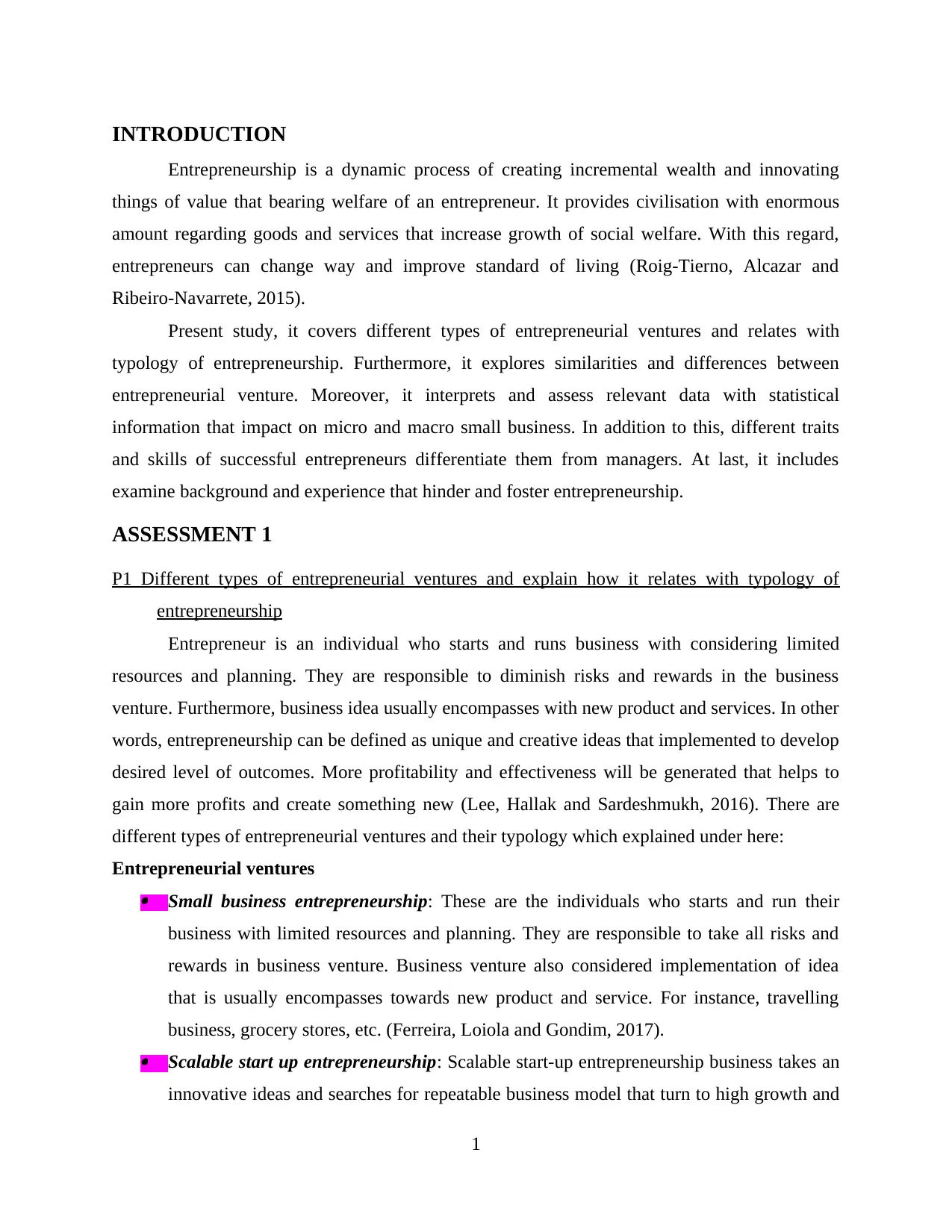
INTRODUCTION
Entrepreneurship is a dynamic process of creating incremental wealth and innovating
things of value that bearing welfare of an entrepreneur. It provides civilisation with enormous
amount regarding goods and services that increase growth of social welfare. With this regard,
entrepreneurs can change way and improve standard of living (Roig-Tierno, Alcazar and
Ribeiro-Navarrete, 2015).
Present study, it covers different types of entrepreneurial ventures and relates with
typology of entrepreneurship. Furthermore, it explores similarities and differences between
entrepreneurial venture. Moreover, it interprets and assess relevant data with statistical
information that impact on micro and macro small business. In addition to this, different traits
and skills of successful entrepreneurs differentiate them from managers. At last, it includes
examine background and experience that hinder and foster entrepreneurship.
ASSESSMENT 1
P1 Different types of entrepreneurial ventures and explain how it relates with typology of
entrepreneurship
Entrepreneur is an individual who starts and runs business with considering limited
resources and planning. They are responsible to diminish risks and rewards in the business
venture. Furthermore, business idea usually encompasses with new product and services. In other
words, entrepreneurship can be defined as unique and creative ideas that implemented to develop
desired level of outcomes. More profitability and effectiveness will be generated that helps to
gain more profits and create something new (Lee, Hallak and Sardeshmukh, 2016). There are
different types of entrepreneurial ventures and their typology which explained under here:
Entrepreneurial ventures Small business entrepreneurship: These are the individuals who starts and run their
business with limited resources and planning. They are responsible to take all risks and
rewards in business venture. Business venture also considered implementation of idea
that is usually encompasses towards new product and service. For instance, travelling
business, grocery stores, etc. (Ferreira, Loiola and Gondim, 2017). Scalable start up entrepreneurship: Scalable start-up entrepreneurship business takes an
innovative ideas and searches for repeatable business model that turn to high growth and
1
Entrepreneurship is a dynamic process of creating incremental wealth and innovating
things of value that bearing welfare of an entrepreneur. It provides civilisation with enormous
amount regarding goods and services that increase growth of social welfare. With this regard,
entrepreneurs can change way and improve standard of living (Roig-Tierno, Alcazar and
Ribeiro-Navarrete, 2015).
Present study, it covers different types of entrepreneurial ventures and relates with
typology of entrepreneurship. Furthermore, it explores similarities and differences between
entrepreneurial venture. Moreover, it interprets and assess relevant data with statistical
information that impact on micro and macro small business. In addition to this, different traits
and skills of successful entrepreneurs differentiate them from managers. At last, it includes
examine background and experience that hinder and foster entrepreneurship.
ASSESSMENT 1
P1 Different types of entrepreneurial ventures and explain how it relates with typology of
entrepreneurship
Entrepreneur is an individual who starts and runs business with considering limited
resources and planning. They are responsible to diminish risks and rewards in the business
venture. Furthermore, business idea usually encompasses with new product and services. In other
words, entrepreneurship can be defined as unique and creative ideas that implemented to develop
desired level of outcomes. More profitability and effectiveness will be generated that helps to
gain more profits and create something new (Lee, Hallak and Sardeshmukh, 2016). There are
different types of entrepreneurial ventures and their typology which explained under here:
Entrepreneurial ventures Small business entrepreneurship: These are the individuals who starts and run their
business with limited resources and planning. They are responsible to take all risks and
rewards in business venture. Business venture also considered implementation of idea
that is usually encompasses towards new product and service. For instance, travelling
business, grocery stores, etc. (Ferreira, Loiola and Gondim, 2017). Scalable start up entrepreneurship: Scalable start-up entrepreneurship business takes an
innovative ideas and searches for repeatable business model that turn to high growth and
1
Paraphrase This Document
Need a fresh take? Get an instant paraphrase of this document with our AI Paraphraser
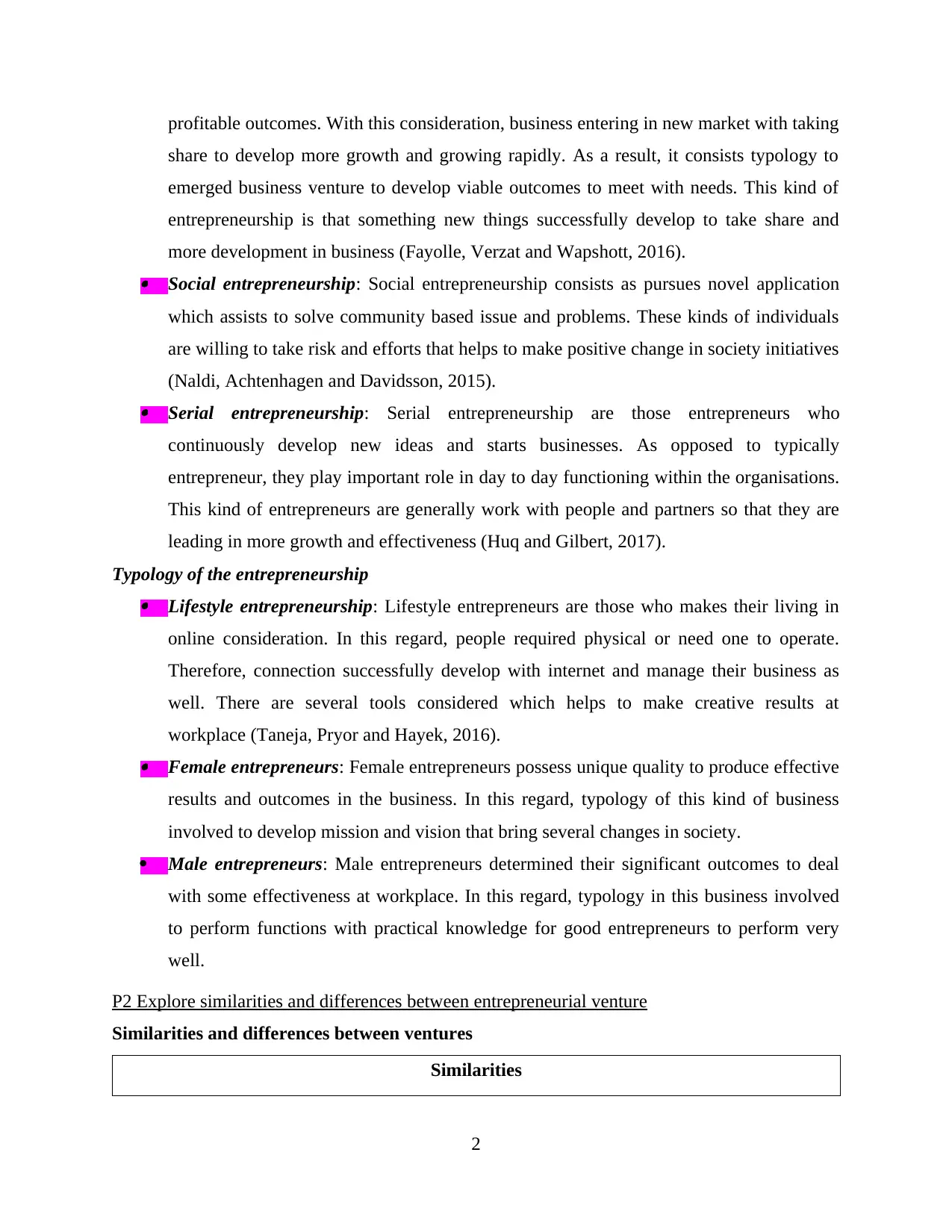
profitable outcomes. With this consideration, business entering in new market with taking
share to develop more growth and growing rapidly. As a result, it consists typology to
emerged business venture to develop viable outcomes to meet with needs. This kind of
entrepreneurship is that something new things successfully develop to take share and
more development in business (Fayolle, Verzat and Wapshott, 2016). Social entrepreneurship: Social entrepreneurship consists as pursues novel application
which assists to solve community based issue and problems. These kinds of individuals
are willing to take risk and efforts that helps to make positive change in society initiatives
(Naldi, Achtenhagen and Davidsson, 2015). Serial entrepreneurship: Serial entrepreneurship are those entrepreneurs who
continuously develop new ideas and starts businesses. As opposed to typically
entrepreneur, they play important role in day to day functioning within the organisations.
This kind of entrepreneurs are generally work with people and partners so that they are
leading in more growth and effectiveness (Huq and Gilbert, 2017).
Typology of the entrepreneurship Lifestyle entrepreneurship: Lifestyle entrepreneurs are those who makes their living in
online consideration. In this regard, people required physical or need one to operate.
Therefore, connection successfully develop with internet and manage their business as
well. There are several tools considered which helps to make creative results at
workplace (Taneja, Pryor and Hayek, 2016). Female entrepreneurs: Female entrepreneurs possess unique quality to produce effective
results and outcomes in the business. In this regard, typology of this kind of business
involved to develop mission and vision that bring several changes in society.
Male entrepreneurs: Male entrepreneurs determined their significant outcomes to deal
with some effectiveness at workplace. In this regard, typology in this business involved
to perform functions with practical knowledge for good entrepreneurs to perform very
well.
P2 Explore similarities and differences between entrepreneurial venture
Similarities and differences between ventures
Similarities
2
share to develop more growth and growing rapidly. As a result, it consists typology to
emerged business venture to develop viable outcomes to meet with needs. This kind of
entrepreneurship is that something new things successfully develop to take share and
more development in business (Fayolle, Verzat and Wapshott, 2016). Social entrepreneurship: Social entrepreneurship consists as pursues novel application
which assists to solve community based issue and problems. These kinds of individuals
are willing to take risk and efforts that helps to make positive change in society initiatives
(Naldi, Achtenhagen and Davidsson, 2015). Serial entrepreneurship: Serial entrepreneurship are those entrepreneurs who
continuously develop new ideas and starts businesses. As opposed to typically
entrepreneur, they play important role in day to day functioning within the organisations.
This kind of entrepreneurs are generally work with people and partners so that they are
leading in more growth and effectiveness (Huq and Gilbert, 2017).
Typology of the entrepreneurship Lifestyle entrepreneurship: Lifestyle entrepreneurs are those who makes their living in
online consideration. In this regard, people required physical or need one to operate.
Therefore, connection successfully develop with internet and manage their business as
well. There are several tools considered which helps to make creative results at
workplace (Taneja, Pryor and Hayek, 2016). Female entrepreneurs: Female entrepreneurs possess unique quality to produce effective
results and outcomes in the business. In this regard, typology of this kind of business
involved to develop mission and vision that bring several changes in society.
Male entrepreneurs: Male entrepreneurs determined their significant outcomes to deal
with some effectiveness at workplace. In this regard, typology in this business involved
to perform functions with practical knowledge for good entrepreneurs to perform very
well.
P2 Explore similarities and differences between entrepreneurial venture
Similarities and differences between ventures
Similarities
2
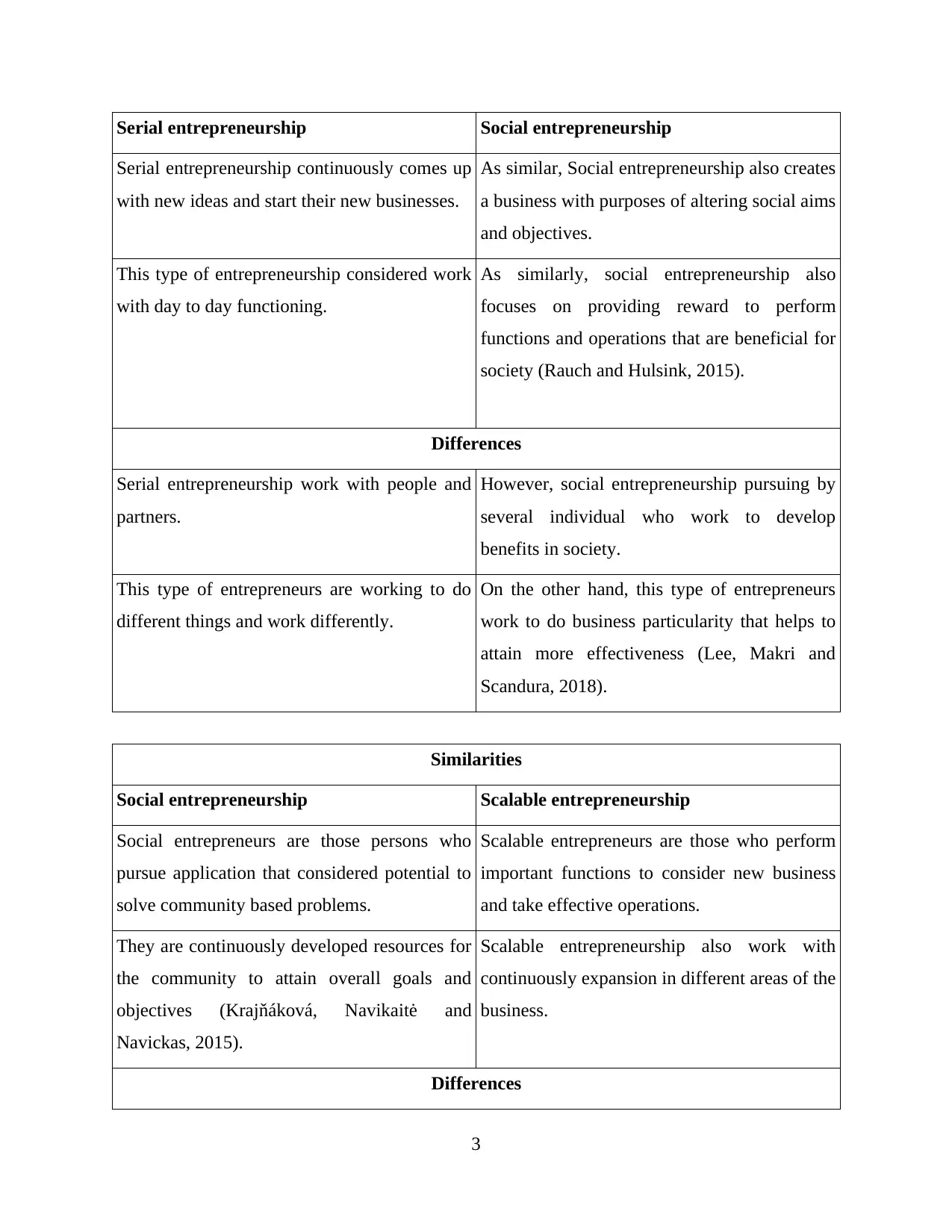
Serial entrepreneurship Social entrepreneurship
Serial entrepreneurship continuously comes up
with new ideas and start their new businesses.
As similar, Social entrepreneurship also creates
a business with purposes of altering social aims
and objectives.
This type of entrepreneurship considered work
with day to day functioning.
As similarly, social entrepreneurship also
focuses on providing reward to perform
functions and operations that are beneficial for
society (Rauch and Hulsink, 2015).
Differences
Serial entrepreneurship work with people and
partners.
However, social entrepreneurship pursuing by
several individual who work to develop
benefits in society.
This type of entrepreneurs are working to do
different things and work differently.
On the other hand, this type of entrepreneurs
work to do business particularity that helps to
attain more effectiveness (Lee, Makri and
Scandura, 2018).
Similarities
Social entrepreneurship Scalable entrepreneurship
Social entrepreneurs are those persons who
pursue application that considered potential to
solve community based problems.
Scalable entrepreneurs are those who perform
important functions to consider new business
and take effective operations.
They are continuously developed resources for
the community to attain overall goals and
objectives (Krajňáková, Navikaitė and
Navickas, 2015).
Scalable entrepreneurship also work with
continuously expansion in different areas of the
business.
Differences
3
Serial entrepreneurship continuously comes up
with new ideas and start their new businesses.
As similar, Social entrepreneurship also creates
a business with purposes of altering social aims
and objectives.
This type of entrepreneurship considered work
with day to day functioning.
As similarly, social entrepreneurship also
focuses on providing reward to perform
functions and operations that are beneficial for
society (Rauch and Hulsink, 2015).
Differences
Serial entrepreneurship work with people and
partners.
However, social entrepreneurship pursuing by
several individual who work to develop
benefits in society.
This type of entrepreneurs are working to do
different things and work differently.
On the other hand, this type of entrepreneurs
work to do business particularity that helps to
attain more effectiveness (Lee, Makri and
Scandura, 2018).
Similarities
Social entrepreneurship Scalable entrepreneurship
Social entrepreneurs are those persons who
pursue application that considered potential to
solve community based problems.
Scalable entrepreneurs are those who perform
important functions to consider new business
and take effective operations.
They are continuously developed resources for
the community to attain overall goals and
objectives (Krajňáková, Navikaitė and
Navickas, 2015).
Scalable entrepreneurship also work with
continuously expansion in different areas of the
business.
Differences
3
⊘ This is a preview!⊘
Do you want full access?
Subscribe today to unlock all pages.

Trusted by 1+ million students worldwide
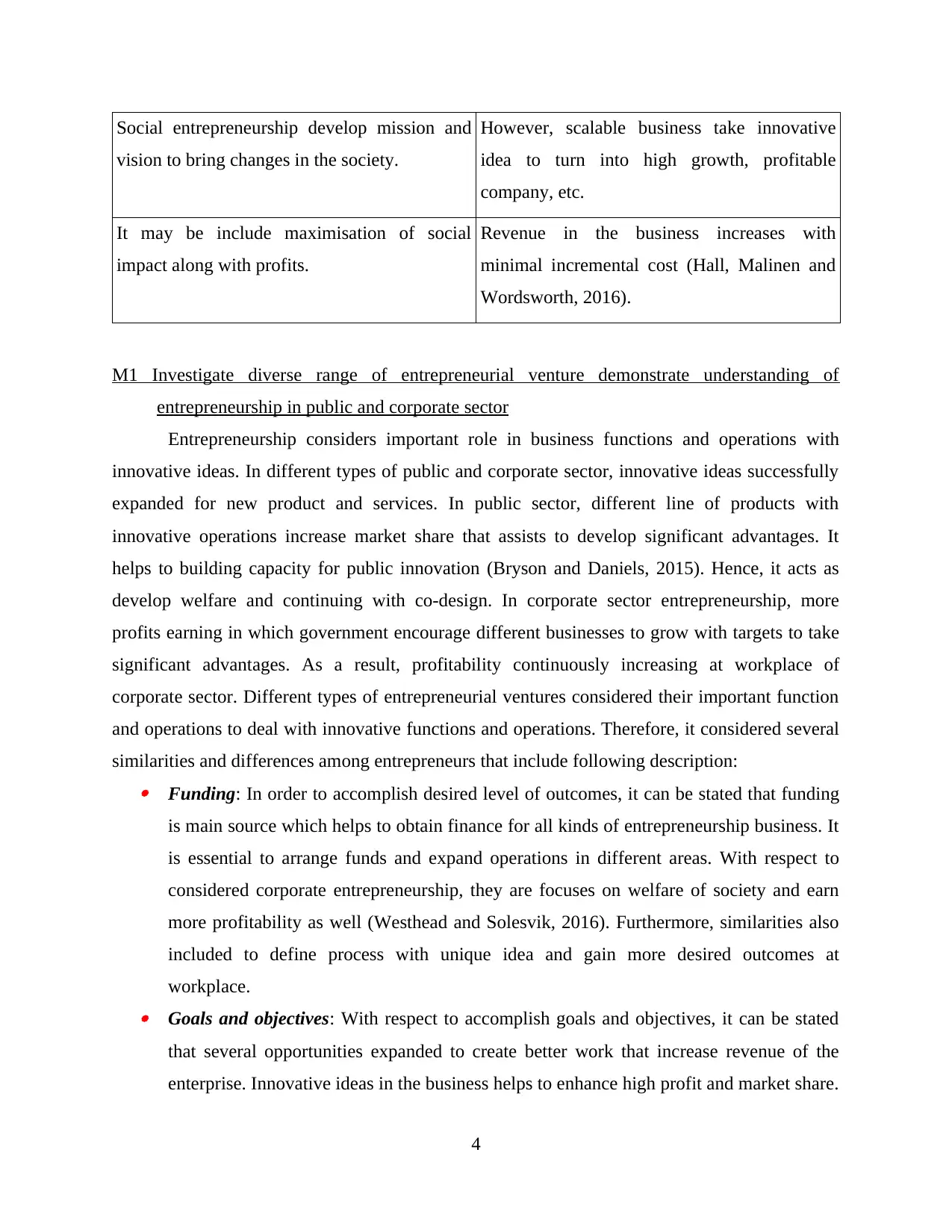
Social entrepreneurship develop mission and
vision to bring changes in the society.
However, scalable business take innovative
idea to turn into high growth, profitable
company, etc.
It may be include maximisation of social
impact along with profits.
Revenue in the business increases with
minimal incremental cost (Hall, Malinen and
Wordsworth, 2016).
M1 Investigate diverse range of entrepreneurial venture demonstrate understanding of
entrepreneurship in public and corporate sector
Entrepreneurship considers important role in business functions and operations with
innovative ideas. In different types of public and corporate sector, innovative ideas successfully
expanded for new product and services. In public sector, different line of products with
innovative operations increase market share that assists to develop significant advantages. It
helps to building capacity for public innovation (Bryson and Daniels, 2015). Hence, it acts as
develop welfare and continuing with co-design. In corporate sector entrepreneurship, more
profits earning in which government encourage different businesses to grow with targets to take
significant advantages. As a result, profitability continuously increasing at workplace of
corporate sector. Different types of entrepreneurial ventures considered their important function
and operations to deal with innovative functions and operations. Therefore, it considered several
similarities and differences among entrepreneurs that include following description: Funding: In order to accomplish desired level of outcomes, it can be stated that funding
is main source which helps to obtain finance for all kinds of entrepreneurship business. It
is essential to arrange funds and expand operations in different areas. With respect to
considered corporate entrepreneurship, they are focuses on welfare of society and earn
more profitability as well (Westhead and Solesvik, 2016). Furthermore, similarities also
included to define process with unique idea and gain more desired outcomes at
workplace. Goals and objectives: With respect to accomplish goals and objectives, it can be stated
that several opportunities expanded to create better work that increase revenue of the
enterprise. Innovative ideas in the business helps to enhance high profit and market share.
4
vision to bring changes in the society.
However, scalable business take innovative
idea to turn into high growth, profitable
company, etc.
It may be include maximisation of social
impact along with profits.
Revenue in the business increases with
minimal incremental cost (Hall, Malinen and
Wordsworth, 2016).
M1 Investigate diverse range of entrepreneurial venture demonstrate understanding of
entrepreneurship in public and corporate sector
Entrepreneurship considers important role in business functions and operations with
innovative ideas. In different types of public and corporate sector, innovative ideas successfully
expanded for new product and services. In public sector, different line of products with
innovative operations increase market share that assists to develop significant advantages. It
helps to building capacity for public innovation (Bryson and Daniels, 2015). Hence, it acts as
develop welfare and continuing with co-design. In corporate sector entrepreneurship, more
profits earning in which government encourage different businesses to grow with targets to take
significant advantages. As a result, profitability continuously increasing at workplace of
corporate sector. Different types of entrepreneurial ventures considered their important function
and operations to deal with innovative functions and operations. Therefore, it considered several
similarities and differences among entrepreneurs that include following description: Funding: In order to accomplish desired level of outcomes, it can be stated that funding
is main source which helps to obtain finance for all kinds of entrepreneurship business. It
is essential to arrange funds and expand operations in different areas. With respect to
considered corporate entrepreneurship, they are focuses on welfare of society and earn
more profitability as well (Westhead and Solesvik, 2016). Furthermore, similarities also
included to define process with unique idea and gain more desired outcomes at
workplace. Goals and objectives: With respect to accomplish goals and objectives, it can be stated
that several opportunities expanded to create better work that increase revenue of the
enterprise. Innovative ideas in the business helps to enhance high profit and market share.
4
Paraphrase This Document
Need a fresh take? Get an instant paraphrase of this document with our AI Paraphraser
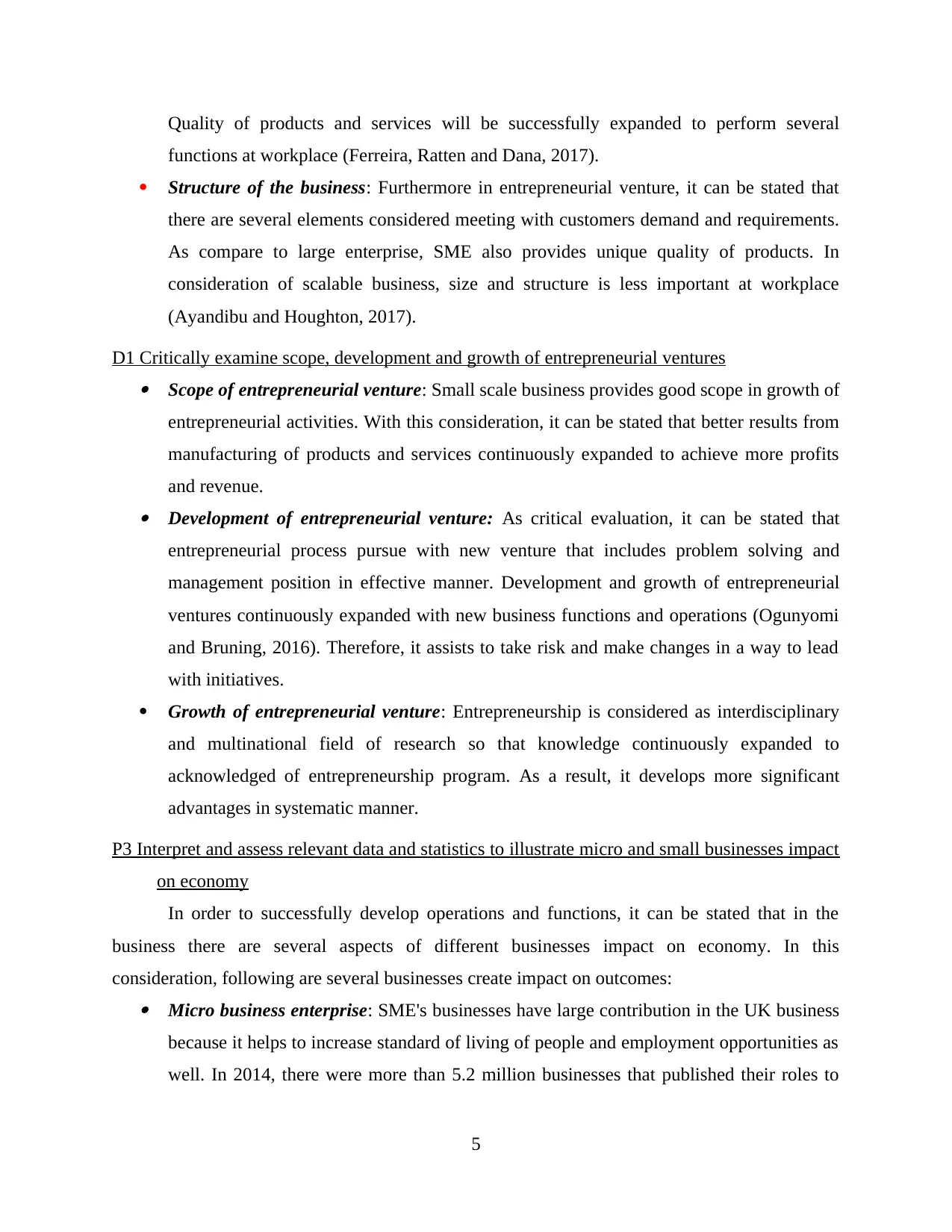
Quality of products and services will be successfully expanded to perform several
functions at workplace (Ferreira, Ratten and Dana, 2017).
Structure of the business: Furthermore in entrepreneurial venture, it can be stated that
there are several elements considered meeting with customers demand and requirements.
As compare to large enterprise, SME also provides unique quality of products. In
consideration of scalable business, size and structure is less important at workplace
(Ayandibu and Houghton, 2017).
D1 Critically examine scope, development and growth of entrepreneurial ventures Scope of entrepreneurial venture: Small scale business provides good scope in growth of
entrepreneurial activities. With this consideration, it can be stated that better results from
manufacturing of products and services continuously expanded to achieve more profits
and revenue. Development of entrepreneurial venture: As critical evaluation, it can be stated that
entrepreneurial process pursue with new venture that includes problem solving and
management position in effective manner. Development and growth of entrepreneurial
ventures continuously expanded with new business functions and operations (Ogunyomi
and Bruning, 2016). Therefore, it assists to take risk and make changes in a way to lead
with initiatives.
Growth of entrepreneurial venture: Entrepreneurship is considered as interdisciplinary
and multinational field of research so that knowledge continuously expanded to
acknowledged of entrepreneurship program. As a result, it develops more significant
advantages in systematic manner.
P3 Interpret and assess relevant data and statistics to illustrate micro and small businesses impact
on economy
In order to successfully develop operations and functions, it can be stated that in the
business there are several aspects of different businesses impact on economy. In this
consideration, following are several businesses create impact on outcomes: Micro business enterprise: SME's businesses have large contribution in the UK business
because it helps to increase standard of living of people and employment opportunities as
well. In 2014, there were more than 5.2 million businesses that published their roles to
5
functions at workplace (Ferreira, Ratten and Dana, 2017).
Structure of the business: Furthermore in entrepreneurial venture, it can be stated that
there are several elements considered meeting with customers demand and requirements.
As compare to large enterprise, SME also provides unique quality of products. In
consideration of scalable business, size and structure is less important at workplace
(Ayandibu and Houghton, 2017).
D1 Critically examine scope, development and growth of entrepreneurial ventures Scope of entrepreneurial venture: Small scale business provides good scope in growth of
entrepreneurial activities. With this consideration, it can be stated that better results from
manufacturing of products and services continuously expanded to achieve more profits
and revenue. Development of entrepreneurial venture: As critical evaluation, it can be stated that
entrepreneurial process pursue with new venture that includes problem solving and
management position in effective manner. Development and growth of entrepreneurial
ventures continuously expanded with new business functions and operations (Ogunyomi
and Bruning, 2016). Therefore, it assists to take risk and make changes in a way to lead
with initiatives.
Growth of entrepreneurial venture: Entrepreneurship is considered as interdisciplinary
and multinational field of research so that knowledge continuously expanded to
acknowledged of entrepreneurship program. As a result, it develops more significant
advantages in systematic manner.
P3 Interpret and assess relevant data and statistics to illustrate micro and small businesses impact
on economy
In order to successfully develop operations and functions, it can be stated that in the
business there are several aspects of different businesses impact on economy. In this
consideration, following are several businesses create impact on outcomes: Micro business enterprise: SME's businesses have large contribution in the UK business
because it helps to increase standard of living of people and employment opportunities as
well. In 2014, there were more than 5.2 million businesses that published their roles to
5
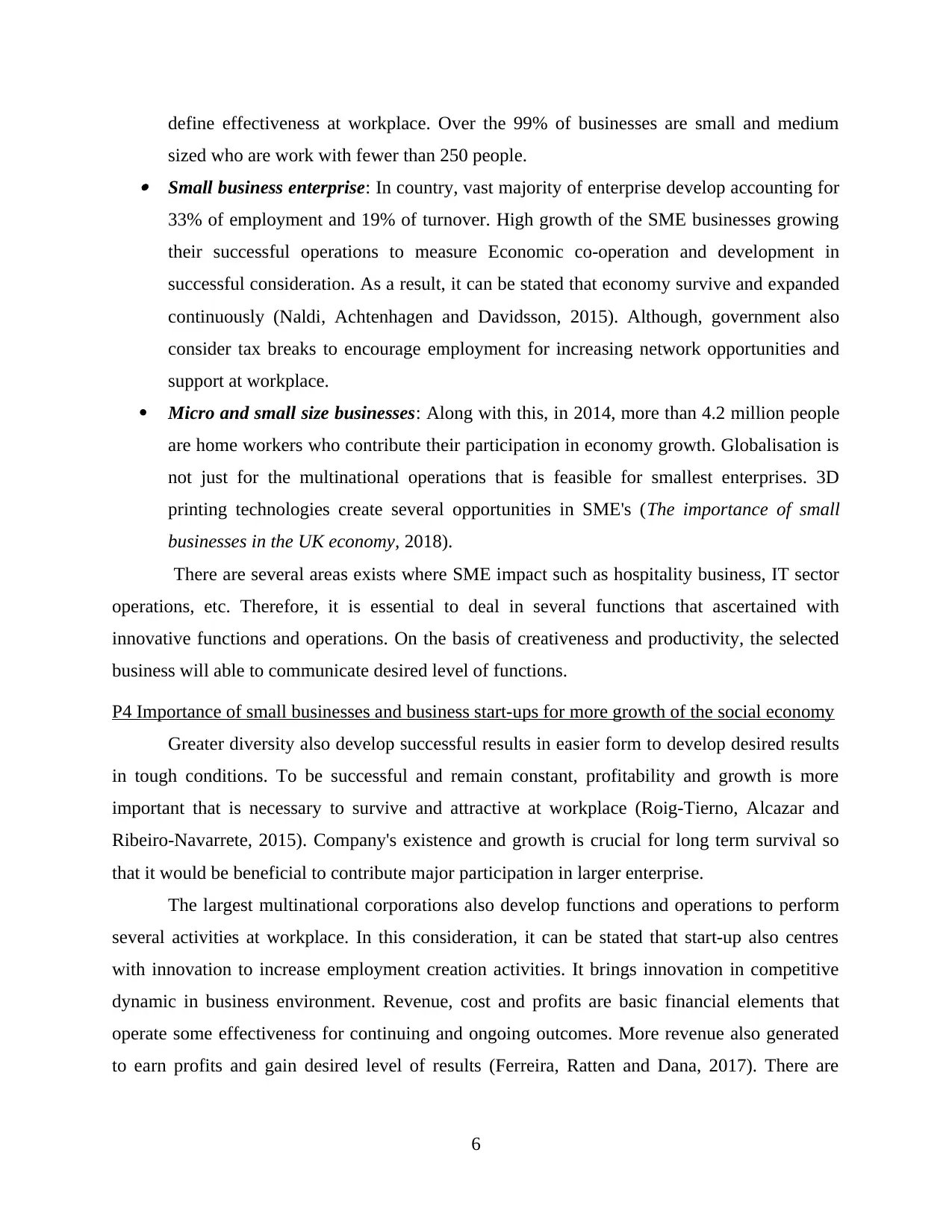
define effectiveness at workplace. Over the 99% of businesses are small and medium
sized who are work with fewer than 250 people. Small business enterprise: In country, vast majority of enterprise develop accounting for
33% of employment and 19% of turnover. High growth of the SME businesses growing
their successful operations to measure Economic co-operation and development in
successful consideration. As a result, it can be stated that economy survive and expanded
continuously (Naldi, Achtenhagen and Davidsson, 2015). Although, government also
consider tax breaks to encourage employment for increasing network opportunities and
support at workplace.
Micro and small size businesses: Along with this, in 2014, more than 4.2 million people
are home workers who contribute their participation in economy growth. Globalisation is
not just for the multinational operations that is feasible for smallest enterprises. 3D
printing technologies create several opportunities in SME's (The importance of small
businesses in the UK economy, 2018).
There are several areas exists where SME impact such as hospitality business, IT sector
operations, etc. Therefore, it is essential to deal in several functions that ascertained with
innovative functions and operations. On the basis of creativeness and productivity, the selected
business will able to communicate desired level of functions.
P4 Importance of small businesses and business start-ups for more growth of the social economy
Greater diversity also develop successful results in easier form to develop desired results
in tough conditions. To be successful and remain constant, profitability and growth is more
important that is necessary to survive and attractive at workplace (Roig-Tierno, Alcazar and
Ribeiro-Navarrete, 2015). Company's existence and growth is crucial for long term survival so
that it would be beneficial to contribute major participation in larger enterprise.
The largest multinational corporations also develop functions and operations to perform
several activities at workplace. In this consideration, it can be stated that start-up also centres
with innovation to increase employment creation activities. It brings innovation in competitive
dynamic in business environment. Revenue, cost and profits are basic financial elements that
operate some effectiveness for continuing and ongoing outcomes. More revenue also generated
to earn profits and gain desired level of results (Ferreira, Ratten and Dana, 2017). There are
6
sized who are work with fewer than 250 people. Small business enterprise: In country, vast majority of enterprise develop accounting for
33% of employment and 19% of turnover. High growth of the SME businesses growing
their successful operations to measure Economic co-operation and development in
successful consideration. As a result, it can be stated that economy survive and expanded
continuously (Naldi, Achtenhagen and Davidsson, 2015). Although, government also
consider tax breaks to encourage employment for increasing network opportunities and
support at workplace.
Micro and small size businesses: Along with this, in 2014, more than 4.2 million people
are home workers who contribute their participation in economy growth. Globalisation is
not just for the multinational operations that is feasible for smallest enterprises. 3D
printing technologies create several opportunities in SME's (The importance of small
businesses in the UK economy, 2018).
There are several areas exists where SME impact such as hospitality business, IT sector
operations, etc. Therefore, it is essential to deal in several functions that ascertained with
innovative functions and operations. On the basis of creativeness and productivity, the selected
business will able to communicate desired level of functions.
P4 Importance of small businesses and business start-ups for more growth of the social economy
Greater diversity also develop successful results in easier form to develop desired results
in tough conditions. To be successful and remain constant, profitability and growth is more
important that is necessary to survive and attractive at workplace (Roig-Tierno, Alcazar and
Ribeiro-Navarrete, 2015). Company's existence and growth is crucial for long term survival so
that it would be beneficial to contribute major participation in larger enterprise.
The largest multinational corporations also develop functions and operations to perform
several activities at workplace. In this consideration, it can be stated that start-up also centres
with innovation to increase employment creation activities. It brings innovation in competitive
dynamic in business environment. Revenue, cost and profits are basic financial elements that
operate some effectiveness for continuing and ongoing outcomes. More revenue also generated
to earn profits and gain desired level of results (Ferreira, Ratten and Dana, 2017). There are
6
⊘ This is a preview!⊘
Do you want full access?
Subscribe today to unlock all pages.

Trusted by 1+ million students worldwide
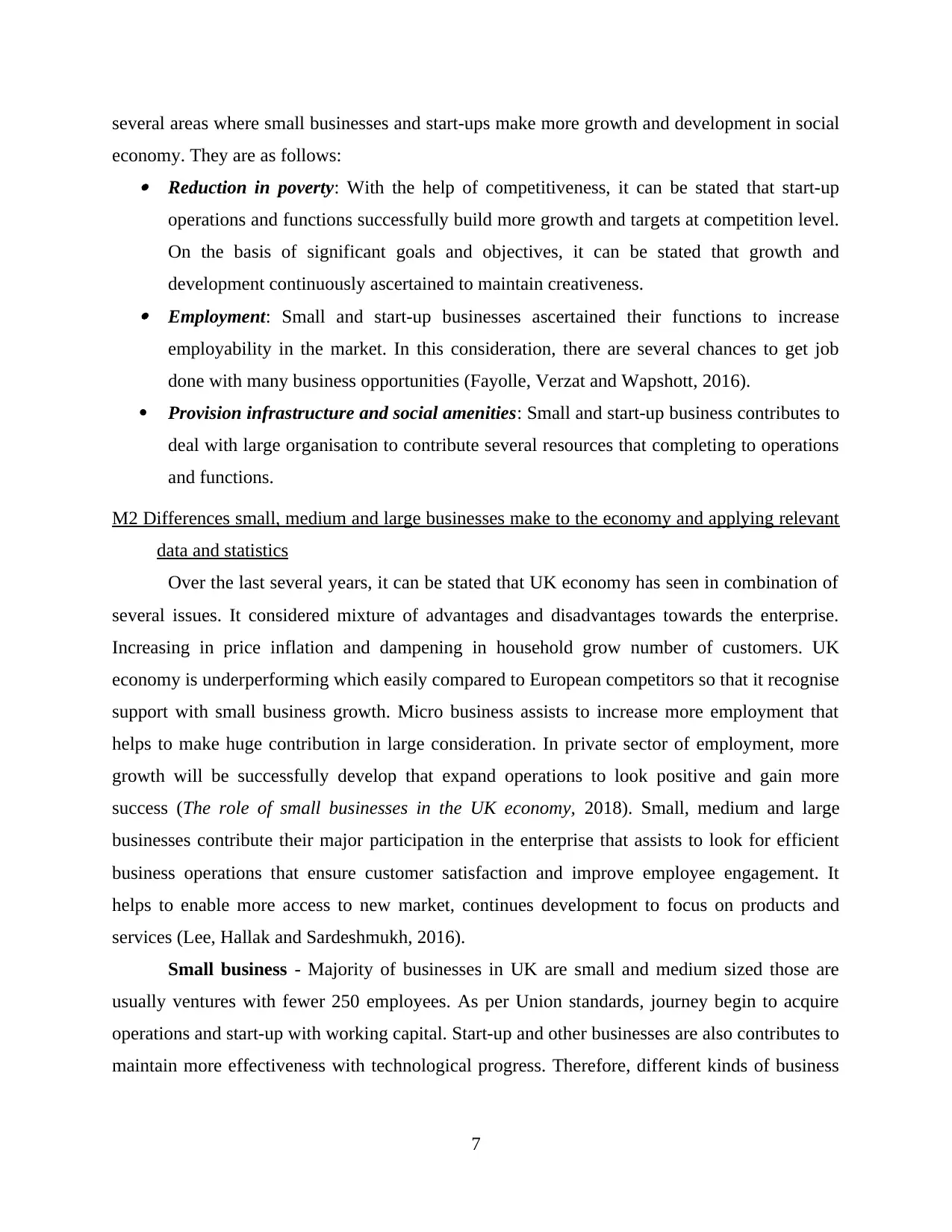
several areas where small businesses and start-ups make more growth and development in social
economy. They are as follows: Reduction in poverty: With the help of competitiveness, it can be stated that start-up
operations and functions successfully build more growth and targets at competition level.
On the basis of significant goals and objectives, it can be stated that growth and
development continuously ascertained to maintain creativeness. Employment: Small and start-up businesses ascertained their functions to increase
employability in the market. In this consideration, there are several chances to get job
done with many business opportunities (Fayolle, Verzat and Wapshott, 2016).
Provision infrastructure and social amenities: Small and start-up business contributes to
deal with large organisation to contribute several resources that completing to operations
and functions.
M2 Differences small, medium and large businesses make to the economy and applying relevant
data and statistics
Over the last several years, it can be stated that UK economy has seen in combination of
several issues. It considered mixture of advantages and disadvantages towards the enterprise.
Increasing in price inflation and dampening in household grow number of customers. UK
economy is underperforming which easily compared to European competitors so that it recognise
support with small business growth. Micro business assists to increase more employment that
helps to make huge contribution in large consideration. In private sector of employment, more
growth will be successfully develop that expand operations to look positive and gain more
success (The role of small businesses in the UK economy, 2018). Small, medium and large
businesses contribute their major participation in the enterprise that assists to look for efficient
business operations that ensure customer satisfaction and improve employee engagement. It
helps to enable more access to new market, continues development to focus on products and
services (Lee, Hallak and Sardeshmukh, 2016).
Small business - Majority of businesses in UK are small and medium sized those are
usually ventures with fewer 250 employees. As per Union standards, journey begin to acquire
operations and start-up with working capital. Start-up and other businesses are also contributes to
maintain more effectiveness with technological progress. Therefore, different kinds of business
7
economy. They are as follows: Reduction in poverty: With the help of competitiveness, it can be stated that start-up
operations and functions successfully build more growth and targets at competition level.
On the basis of significant goals and objectives, it can be stated that growth and
development continuously ascertained to maintain creativeness. Employment: Small and start-up businesses ascertained their functions to increase
employability in the market. In this consideration, there are several chances to get job
done with many business opportunities (Fayolle, Verzat and Wapshott, 2016).
Provision infrastructure and social amenities: Small and start-up business contributes to
deal with large organisation to contribute several resources that completing to operations
and functions.
M2 Differences small, medium and large businesses make to the economy and applying relevant
data and statistics
Over the last several years, it can be stated that UK economy has seen in combination of
several issues. It considered mixture of advantages and disadvantages towards the enterprise.
Increasing in price inflation and dampening in household grow number of customers. UK
economy is underperforming which easily compared to European competitors so that it recognise
support with small business growth. Micro business assists to increase more employment that
helps to make huge contribution in large consideration. In private sector of employment, more
growth will be successfully develop that expand operations to look positive and gain more
success (The role of small businesses in the UK economy, 2018). Small, medium and large
businesses contribute their major participation in the enterprise that assists to look for efficient
business operations that ensure customer satisfaction and improve employee engagement. It
helps to enable more access to new market, continues development to focus on products and
services (Lee, Hallak and Sardeshmukh, 2016).
Small business - Majority of businesses in UK are small and medium sized those are
usually ventures with fewer 250 employees. As per Union standards, journey begin to acquire
operations and start-up with working capital. Start-up and other businesses are also contributes to
maintain more effectiveness with technological progress. Therefore, different kinds of business
7
Paraphrase This Document
Need a fresh take? Get an instant paraphrase of this document with our AI Paraphraser
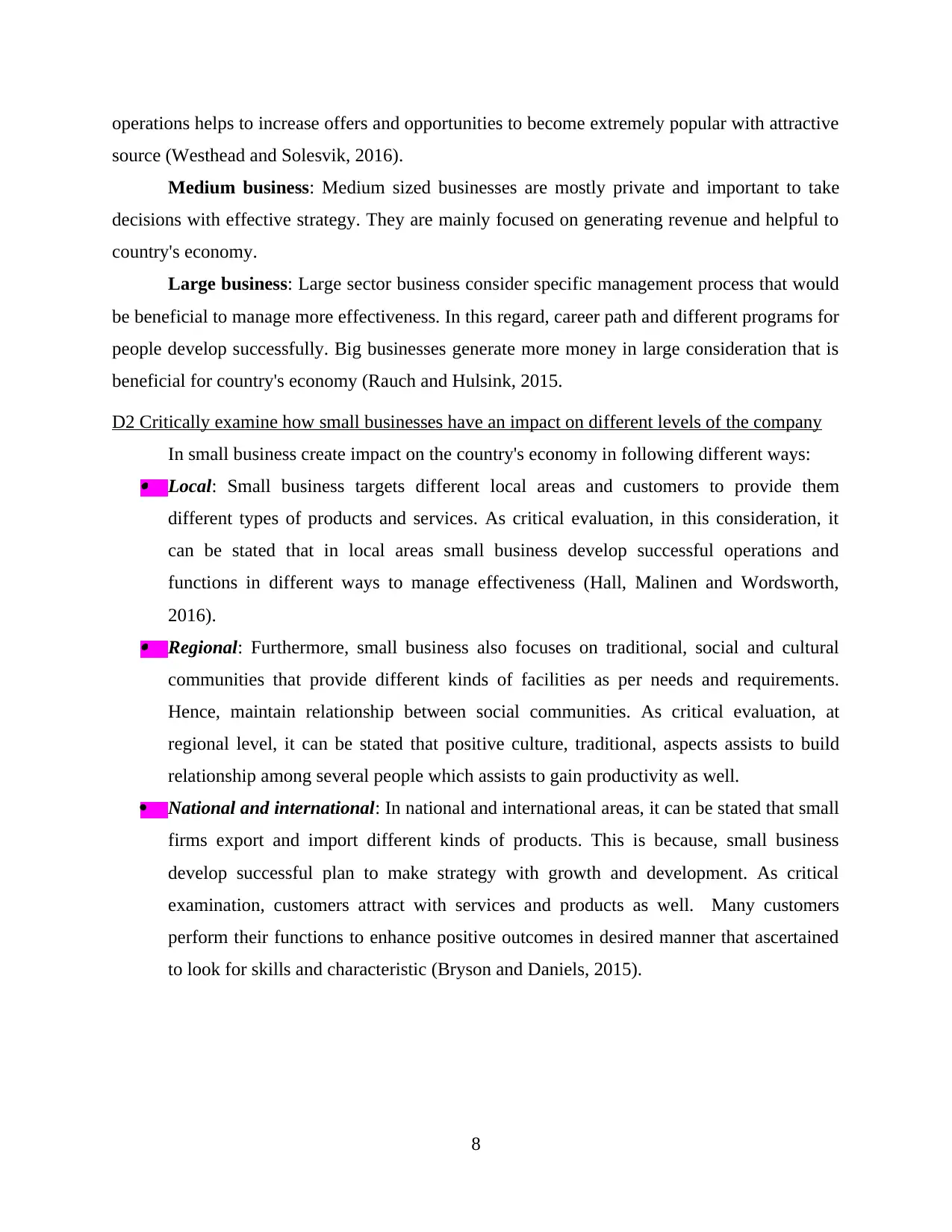
operations helps to increase offers and opportunities to become extremely popular with attractive
source (Westhead and Solesvik, 2016).
Medium business: Medium sized businesses are mostly private and important to take
decisions with effective strategy. They are mainly focused on generating revenue and helpful to
country's economy.
Large business: Large sector business consider specific management process that would
be beneficial to manage more effectiveness. In this regard, career path and different programs for
people develop successfully. Big businesses generate more money in large consideration that is
beneficial for country's economy (Rauch and Hulsink, 2015.
D2 Critically examine how small businesses have an impact on different levels of the company
In small business create impact on the country's economy in following different ways: Local: Small business targets different local areas and customers to provide them
different types of products and services. As critical evaluation, in this consideration, it
can be stated that in local areas small business develop successful operations and
functions in different ways to manage effectiveness (Hall, Malinen and Wordsworth,
2016). Regional: Furthermore, small business also focuses on traditional, social and cultural
communities that provide different kinds of facilities as per needs and requirements.
Hence, maintain relationship between social communities. As critical evaluation, at
regional level, it can be stated that positive culture, traditional, aspects assists to build
relationship among several people which assists to gain productivity as well.
National and international: In national and international areas, it can be stated that small
firms export and import different kinds of products. This is because, small business
develop successful plan to make strategy with growth and development. As critical
examination, customers attract with services and products as well. Many customers
perform their functions to enhance positive outcomes in desired manner that ascertained
to look for skills and characteristic (Bryson and Daniels, 2015).
8
source (Westhead and Solesvik, 2016).
Medium business: Medium sized businesses are mostly private and important to take
decisions with effective strategy. They are mainly focused on generating revenue and helpful to
country's economy.
Large business: Large sector business consider specific management process that would
be beneficial to manage more effectiveness. In this regard, career path and different programs for
people develop successfully. Big businesses generate more money in large consideration that is
beneficial for country's economy (Rauch and Hulsink, 2015.
D2 Critically examine how small businesses have an impact on different levels of the company
In small business create impact on the country's economy in following different ways: Local: Small business targets different local areas and customers to provide them
different types of products and services. As critical evaluation, in this consideration, it
can be stated that in local areas small business develop successful operations and
functions in different ways to manage effectiveness (Hall, Malinen and Wordsworth,
2016). Regional: Furthermore, small business also focuses on traditional, social and cultural
communities that provide different kinds of facilities as per needs and requirements.
Hence, maintain relationship between social communities. As critical evaluation, at
regional level, it can be stated that positive culture, traditional, aspects assists to build
relationship among several people which assists to gain productivity as well.
National and international: In national and international areas, it can be stated that small
firms export and import different kinds of products. This is because, small business
develop successful plan to make strategy with growth and development. As critical
examination, customers attract with services and products as well. Many customers
perform their functions to enhance positive outcomes in desired manner that ascertained
to look for skills and characteristic (Bryson and Daniels, 2015).
8
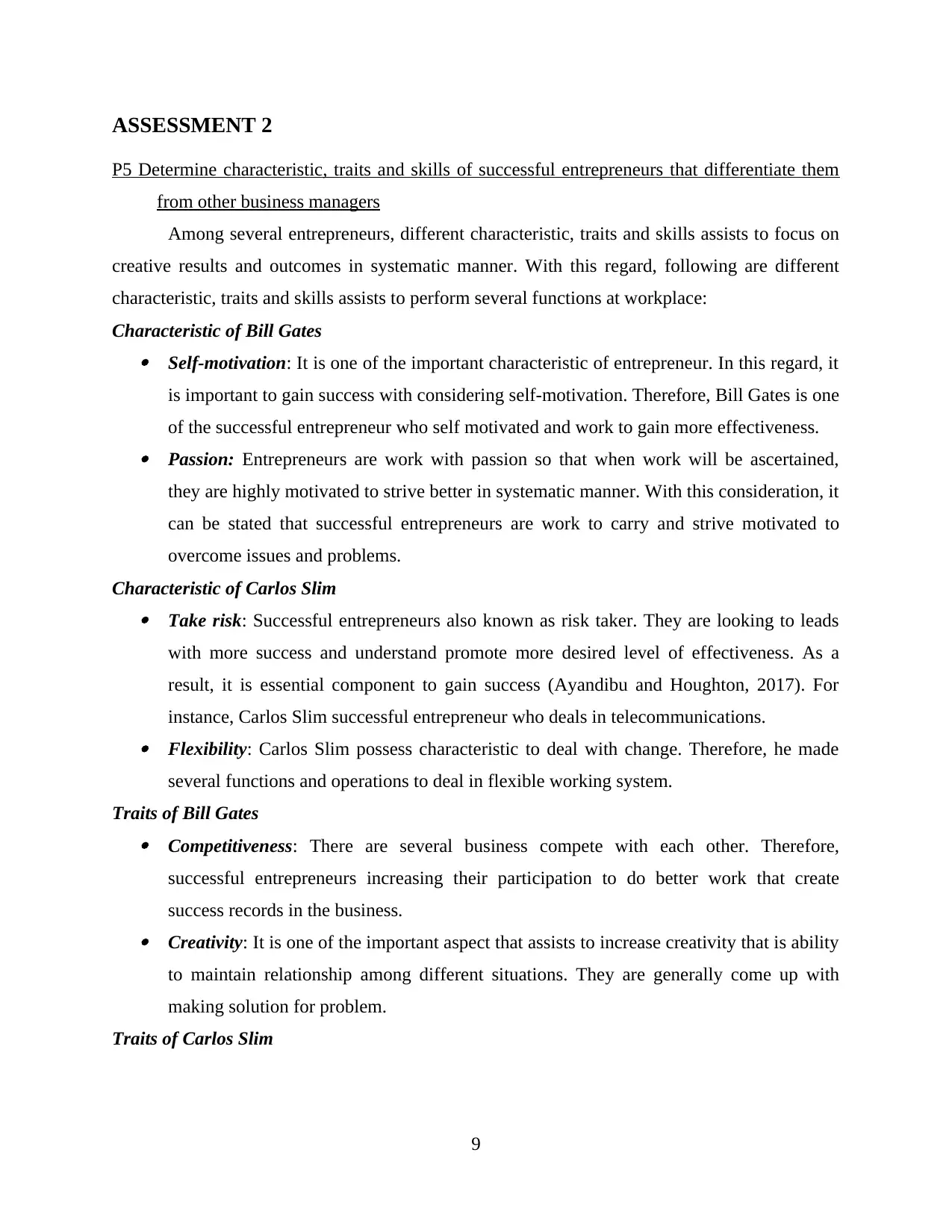
ASSESSMENT 2
P5 Determine characteristic, traits and skills of successful entrepreneurs that differentiate them
from other business managers
Among several entrepreneurs, different characteristic, traits and skills assists to focus on
creative results and outcomes in systematic manner. With this regard, following are different
characteristic, traits and skills assists to perform several functions at workplace:
Characteristic of Bill Gates Self-motivation: It is one of the important characteristic of entrepreneur. In this regard, it
is important to gain success with considering self-motivation. Therefore, Bill Gates is one
of the successful entrepreneur who self motivated and work to gain more effectiveness. Passion: Entrepreneurs are work with passion so that when work will be ascertained,
they are highly motivated to strive better in systematic manner. With this consideration, it
can be stated that successful entrepreneurs are work to carry and strive motivated to
overcome issues and problems.
Characteristic of Carlos Slim Take risk: Successful entrepreneurs also known as risk taker. They are looking to leads
with more success and understand promote more desired level of effectiveness. As a
result, it is essential component to gain success (Ayandibu and Houghton, 2017). For
instance, Carlos Slim successful entrepreneur who deals in telecommunications. Flexibility: Carlos Slim possess characteristic to deal with change. Therefore, he made
several functions and operations to deal in flexible working system.
Traits of Bill Gates Competitiveness: There are several business compete with each other. Therefore,
successful entrepreneurs increasing their participation to do better work that create
success records in the business. Creativity: It is one of the important aspect that assists to increase creativity that is ability
to maintain relationship among different situations. They are generally come up with
making solution for problem.
Traits of Carlos Slim
9
P5 Determine characteristic, traits and skills of successful entrepreneurs that differentiate them
from other business managers
Among several entrepreneurs, different characteristic, traits and skills assists to focus on
creative results and outcomes in systematic manner. With this regard, following are different
characteristic, traits and skills assists to perform several functions at workplace:
Characteristic of Bill Gates Self-motivation: It is one of the important characteristic of entrepreneur. In this regard, it
is important to gain success with considering self-motivation. Therefore, Bill Gates is one
of the successful entrepreneur who self motivated and work to gain more effectiveness. Passion: Entrepreneurs are work with passion so that when work will be ascertained,
they are highly motivated to strive better in systematic manner. With this consideration, it
can be stated that successful entrepreneurs are work to carry and strive motivated to
overcome issues and problems.
Characteristic of Carlos Slim Take risk: Successful entrepreneurs also known as risk taker. They are looking to leads
with more success and understand promote more desired level of effectiveness. As a
result, it is essential component to gain success (Ayandibu and Houghton, 2017). For
instance, Carlos Slim successful entrepreneur who deals in telecommunications. Flexibility: Carlos Slim possess characteristic to deal with change. Therefore, he made
several functions and operations to deal in flexible working system.
Traits of Bill Gates Competitiveness: There are several business compete with each other. Therefore,
successful entrepreneurs increasing their participation to do better work that create
success records in the business. Creativity: It is one of the important aspect that assists to increase creativity that is ability
to maintain relationship among different situations. They are generally come up with
making solution for problem.
Traits of Carlos Slim
9
⊘ This is a preview!⊘
Do you want full access?
Subscribe today to unlock all pages.

Trusted by 1+ million students worldwide
1 out of 18
Related Documents
Your All-in-One AI-Powered Toolkit for Academic Success.
+13062052269
info@desklib.com
Available 24*7 on WhatsApp / Email
![[object Object]](/_next/static/media/star-bottom.7253800d.svg)
Unlock your academic potential
Copyright © 2020–2026 A2Z Services. All Rights Reserved. Developed and managed by ZUCOL.




